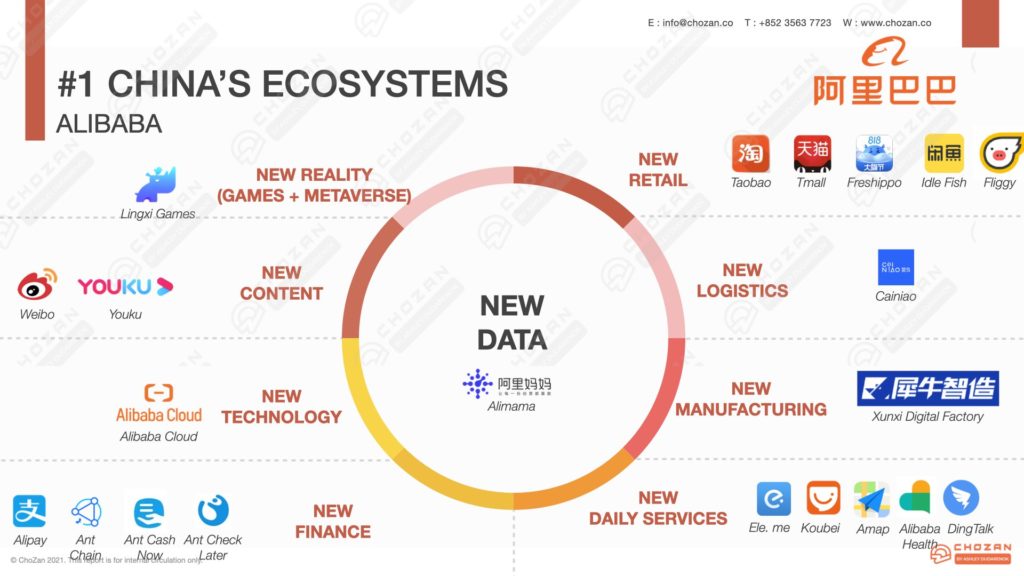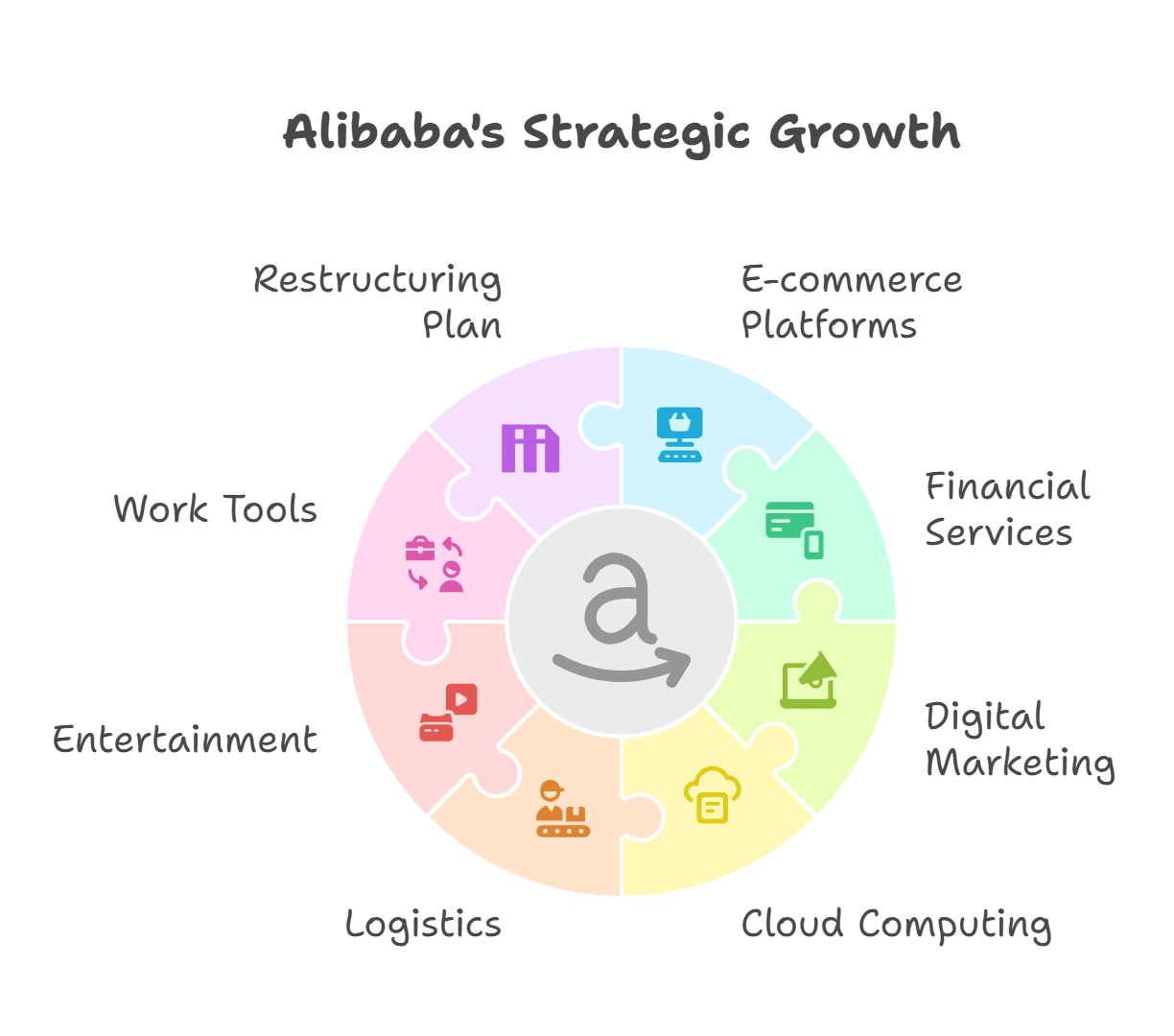Alibaba’s Ecosystem: Structure and Components
Alibaba is not just an e-commerce company; it is a vast digital ecosystem that integrates commerce, logistics, payments, cloud computing, digital media, and local services. This ecosystem is built around several core platforms and services:
- E-commerce: Alibaba operates multiple platforms catering to different markets and business models. Alibaba.com serves B2B global trade, Taobao is a C2C and B2C marketplace in China, Tmall focuses on B2C in China, AliExpress targets international B2C consumers, and Lazada serves Southeast Asia. Other specialized platforms include Juhuasuan (flash sales), FreshHippo (online grocery), AliHealth (healthcare e-commerce), and Kaola (cross-border B2C).
- Financial Services: Ant Group (formerly Ant Financial), which operates Alipay, provides digital payment solutions, online banking, and other fintech services, supporting both consumers and merchants within the ecosystem.
- Logistics: Cainiao Network, Alibaba’s logistics arm, optimizes supply chain and delivery processes, enabling efficient cross-border and domestic shipping.
- Cloud Computing: Alibaba Cloud offers scalable cloud infrastructure and services, supporting not only Alibaba’s own operations but also external businesses.
- Digital Media and Entertainment: Platforms like Youku (video streaming) and Alibaba Pictures (film production) diversify revenue streams and enhance user engagement.
- Local Services: Services such as Ele.me (food delivery) and Koubei (local commerce) integrate daily life into the Alibaba ecosystem.
Alibaba’s Business Model and Revenue Streams
Alibaba’s core strategy is to act as an intermediary, connecting buyers and sellers without holding inventory—an asset-light marketplace model. This allows rapid scaling and minimizes operational costs. Revenue is generated through:
- Platform commissions and membership fees from merchants using its marketplaces.
- Advertising on its e-commerce platforms.
- Cloud computing services via Alibaba Cloud.
- Financial services through Ant Group/Alipay.
- Logistics services via Cainiao Network.
- Digital media and entertainment through platforms like Youku.
By integrating these services, Alibaba boosts user retention, enables cross-selling, and reinvests profits into high-growth technology sectors.
Alibaba’s Role in Global Trade
Alibaba has significantly impacted global commerce by:
- Empowering SMEs: Small and medium-sized enterprises (SMEs) gain access to a global audience, tools, and resources, enabling them to compete internationally.
- Facilitating Cross-Border Trade: Platforms like AliExpress and Tmall Global simplify international buying and selling, breaking down geographical barriers and reducing the complexity of global transactions.
- Innovating Payments and Logistics: Alipay has driven the adoption of mobile payments, while Cainiao Network has transformed logistics and supply chain management, making cross-border shipping more efficient and trackable.
- Connecting Global Buyers and Sellers: Alibaba.com links Chinese manufacturers with international buyers, creating a vast network that supports global sourcing and procurement.
Comparison with Other E-Commerce Giants
| Feature | Alibaba | Amazon (for comparison) |
|---|---|---|
| Core Model | Marketplace intermediary (asset-light) | Retailer + Marketplace (asset-heavy) |
| Inventory | Does not hold inventory | Holds and manages inventory |
| Focus | B2B, B2C, C2C; global and emerging markets | Primarily B2C; strong in developed markets |
| Ecosystem | Integrated commerce, payments, logistics, cloud, media | Commerce, cloud, media, logistics |
| Revenue Streams | Commissions, ads, cloud, fintech, logistics, media | Retail sales, marketplace fees, cloud, ads |
Key Takeaways
- Alibaba’s ecosystem is a unified digital infrastructure that supports commerce, payments, logistics, cloud, and entertainment, making it integral to daily life and business in China and increasingly globally.
- Global trade impact: Alibaba lowers barriers for SMEs, streamlines cross-border commerce, and drives innovation in payments and logistics, reshaping how businesses and consumers connect worldwide.
- Business model: Its asset-light, platform-based approach allows rapid growth and diversification, with multiple monetized services reinforcing its ecosystem.
Alibaba’s role in global trade is both transformative and expansive, providing tools and platforms that empower businesses of all sizes to participate in the global economy.




















Ang PH Ranking ay nag-aalok ng pinakamataas na kalidad ng mga serbisyo sa website traffic sa Pilipinas. Nagbibigay kami ng iba’t ibang uri ng serbisyo sa trapiko para sa aming mga kliyente, kabilang ang website traffic, desktop traffic, mobile traffic, Google traffic, search traffic, eCommerce traffic, YouTube traffic, at TikTok traffic. Ang aming website ay may 100% kasiyahan ng customer, kaya maaari kang bumili ng malaking dami ng SEO traffic online nang may kumpiyansa. Sa halagang 720 PHP bawat buwan, maaari mong agad pataasin ang trapiko sa website, pagandahin ang SEO performance, at pataasin ang iyong mga benta!
Nahihirapan bang pumili ng traffic package? Makipag-ugnayan sa amin, at tutulungan ka ng aming staff.
Libreng Konsultasyon